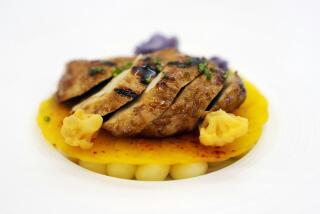You Say Tomato, Biotech Firm Says Bonanza
- Share via
DAVIS — Virginia Waters bought some to take back to Massachusetts. Bill Johnson got some to mail to his mom in Florida. And Connie Presley was taking some home to use in sandwiches for the kids’ lunch.
At the State Market grocery store in Davis on Saturday, America’s newest and most controversial tomatoes were selling faster than you can say marinara sauce as buyers came from all over to be among the first to taste and buy genetically engineered fruit.
An old-fashioned produce cart was installed at the neighborhood market and people gathered round to sample bites and offer critiques of the MacGregor tomatoes. Handing out the free samples were employees of Calgene, this university town’s biotechnology company, which developed the tomatoes and Wednesday got approval from the Food and Drug Administration to market them.
Many shoppers, aware of history in the making, brought along their cameras and photographed the plump red tomatoes and the beaming owners of the grocery store--one of only two places in America you could obtain the tomatoes Saturday. (The other was the Carrot Top market in the Chicago suburb of Northbrook, Ill.)
“These are wonderful,” said Waters, in town visiting relatives. “They are not at all like the tasteless, horrible, hard things we get in Massachusetts.”
If Calgene is right about the tomatoes, grown from its gene-spliced Flavr Savr seeds, Waters and Johnson needn’t worry whether they will still taste good after being shipped across country. Calgene isolated the gene that initiates the tomato’s rotting process, cloned the gene and reinserted it in reverse to neutralize or slow down the rotting process.
The tomatoes can be kept on the vine longer, developing the sweetness that most commercially grown tomatoes lack because they are picked green and ripened artificially. It took the company more than $25 million to develop the tomato, and five years to get FDA approval to market it.
At the State Market on Saturday, they were going for $1.99 a pound. Regular vine-ripened tomatoes cost $1.19.
Many of the shoppers at the store, near UC Davis, where agriculture and genetics are a way of life, spoke knowledgeably about the tomatoes and the science used to create them.
Six-year-old Ellen Presley, riding in her mom’s grocery cart, just kept saying, “They’re perfect! They’re perfect!”
But there were a few skeptics who declined an invitation to taste. One was a professed longtime tomato hater. Another was Eve Holloway, a 47-year-old Davis resident, who admitted being “a little afraid” of eating one.
Holloway said she was concerned that future genetically engineered foods would not get the intense governmental scrutiny that the tomato did, and that other products wouldn’t have to be labeled as products of genetic engineering. (Calgene is voluntarily labeling its tomatoes.)
Still, her apprehension wasn’t strong enough to keep her 14-year-old son, Ian, from sampling the tomatoes, not once, but twice.
Bert Gee, owner of the State Market, said he knew his customers would be receptive to the new tomatoes. Calgene officials said they wanted to introduce the tomato in just such a place as Gee’s market, where family members have been running the store and calling customers by their first names for more than 50 years.
Gee also got some new customers, as word spread that the tomato was making its debut. One UC faculty member bicycled over from the Davis Farmer’s Market, where he had been offered a taste of the MacGregor by a woman who bought a box of them to offer to the shoppers there.
“They are as good as the ones from home,” said Luis Perez, a transplant from Spain who was making his usual Saturday rounds of the organic produce stalls at the farmer’s market when he tasted the new tomato.
The tomatoes also reminded Yukiko Clark of home. A native of Japan, she has lived in the United States since 1960, and in all that time, she said, she hasn’t tasted a tomato as good as the Calgene variety, with the possible exception of a few grown in a friend’s back yard. “When I was a child,” she said, “we ate tomatoes as fruit, not just in salads. I think this is great. I can eat it like fruit again.”
Calgene officials cheered when the first customer purchased a few pounds shortly after 9 a.m. One hundred sixty boxes of tomatoes were shipped in from the Southern California fields where they were grown; Gee expected them to be gone by Monday.
Calgene hopes to have the tomatoes in Southern California markets “as soon as they can be picked.”
More to Read
Inside the business of entertainment
The Wide Shot brings you news, analysis and insights on everything from streaming wars to production — and what it all means for the future.
You may occasionally receive promotional content from the Los Angeles Times.










